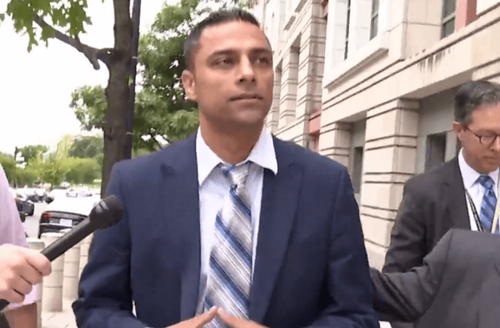Authored by Tim Donner via Liberty Nation,
This is the second of a two-part series on a massive scandal which has gone largely unreported, based on an interview on Liberty Nation Radiowith Luke Rosiak, author of Obstruction of Justice: How the Deep State Risked National Security to Protect the Democrats. In part one, Mr. Rosiak described how the scandal unfolded and jeopardized the security of more than two dozen Democratic members of Congress.
The media, the DOJ, and the Democrats: A powerful axis with the ability to shape what we perceive as the issue of the day...
It was a scandal that threatened to metastasize and blow up in the face of Democrats in a presidential election year like no other. But with the Hillary Clinton email scandal growing by the day, Democrats willing to do almost anything to avoid the specter of a Donald Trump presidency, the FBI burying their findings and a drive-by media behaving with a distinct lack of curiosity, few people took notice.
Imram Awam, an IT specialist and Pakistani national with a checkered past, yet unvetted by the many congressional Democrats who employed his services, took advantage of the unfettered access he was granted to their computer files to hack, steal, blackmail – and even threaten to kill his wife’s family – in the process placing national security in distinct jeopardy.
We were joined on Liberty Nation Radio by Luke Rosiak, an investigative reporter at the Daily Caller, who has just released the definitive book on this scandal, Obstruction of Justice: How the Deep State Risked National Security to Protect the Democrats.
Tim Donner: This scandal went relatively unnoticed, because it came to a head in the heat of the 2016 presidential campaign. Do you think it would have been in the headlines and stayed there for some time if it happened at another time? Or would it have been written off like all the revelations about the FBI’s covert investigation of Trump, which we now know began before the presidential election?
Luke Rosiak: That’s an interesting question because the media is a big part of this story, isn’t it? I mean, and what I basically learned through the reporting of this is I approached it first as what I just said. It’s a remarkable national security story that I thought surely everyone would be interested in. I had The Washington Post right behind me following my leads.
Soon, I saw that no one was looking. I would write these stories, and I would say, “Look at the court documents from civil court. Look at these government records, these photographs, all this proof, and all this evidence.” There was basically just a campaign of concealment. And the media gladly went along with it, and they kind of bought the idea of fake news. You can just kind of say that now whenever it’s convenient. Politicians can get away with a lot by just saying, “It’s fake news.” And they do that on both sides, of course.
The other thing is really just the lack of investigative reporting, especially when it’s not something that a lot of the media is interested in. It just turned out that, as you said, there was a much bigger appetite for this Russia story that is really kind of running on fumes here. No one can tell us exactly who was … the Trump campaign did what with Russia? But the media is very, very interested.
Meanwhile, we’ve got direct evidence, and this is investigators on Capitol Hill. The Capitol police wrote a memo saying that after they caught this guy hacking Congress and actually hacking a particular server called the House Democratic Caucus server, the Capitol police wrote a memo saying that that server disappeared. It’s like holy cow, an important Democratic server disappeared while it’s evidence in a hacking probe. This is huge stuff. It’s documented by government investigators. And the media had no appetite for it. So ultimately, the Democrats kind of worked the FBI, and the FBI goes along with making this thing go away despite all the evidence. Then the media says, “No need to look into this. The FBI says there’s nothing there.”
So my book documents, and the readers can see for themselves and judge for themselves, what happened on Capitol Hill with this Pakistani hack and the frightening ties to foreign governments and the track record of blackmail, and then the FBI basically conspiring to rig a political case.
But the other thing that’s really important for people to learn from it is it shows you how they work behind the scenes to manipulate what we hear about and manipulate the system of justice here in America.
Tim: What conclusions have you personally drawn from your extensive research about the pervasiveness of official corruption in Washington?
Luke Rosiak: I’m shocked by how corrupt Congress is. I’ve been an investigative reporter here in Washington for a decade, and I’ve seen a lot. But the cynicism on Capitol Hill and the willingness to put personal reputation above all else. This may not sound … maybe everyone’s saying, “Yes, we already know that.” But this particular case, it kind of underscored. I saw things with my own eyes that were shocking.
So this guy was taking all this equipment from Congress, for example, and sending it over to Pakistan. In one congresswoman’s office, a tenth of her budget disappeared. That’s enough for ten computers for every staff. They had invoices and so on proving this on Capitol Hill. They put out the statements, and we’re not going to seek any charges in this case.
There is no way to justify it. They want to act like, “That one reporter. He must be doing fake news.” But it’s documented. So it’s remarkable to see the people we trust, and in other words, okay, you’ve got this Pakistani guy. He’s a horrible guy. Things happen. There are always bad people out there in the world. But what really shook me is to see the people that we trusted, the ones we elected and also the ones that we task with enforcing the law with the FBI and the DOJ, to see those people letting us down, it really shook my faith in some of the fundamental institutions that we count on in America.
I think anyone who reads the book is going to see that it’s actually a remarkably sympathetic and empathetic portrait of what happened in Capitol Hill and a lot of people who were struggling with the decision of, “Should I do the right thing even if it puts my job at risk?” So this is a story about human beings, that a lot of times who chose convenience over speaking out. Then there’s also a few heroes in that mix who came forward and tried to do the right thing despite all the retaliation. They retroactively try to spin it as partisan, but when you read the book, it’s all Democratic whistleblowers who first were calling attention to the wrongdoing that they had witnessed on Capitol Hill.
Tim: What lesson should be learned? What should voters take away from what you’ve uncovered in this book?
Luke Rosiak: I think that to question everything is really one of the lessons, I think, because the techniques that they use, the Democrats working with the DOJ and the media, that’s a powerful axis right now. That trifecta, the three of them working together have the ability to shape a lot of what we perceive as being the main issues of the day or the biggest things. It turns out that it’s kind of a big PR operation with a lot of very savvy people. I call them puppeteers on Capitol Hill, and I go into how they’re manipulating us. So identifying the ways in which we are being manipulated, I think, is key for Americans. Because these kind of tricks are going on all the time, and it’s important for us to be able to see what they’re doing to us.
via IFTTT


